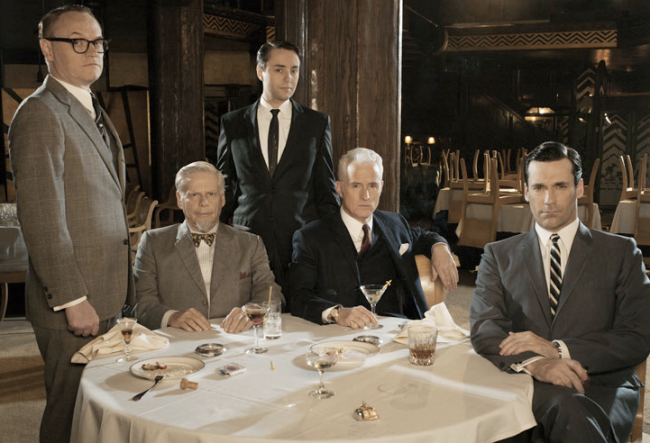Footnotes of Mad Men: Charismatic Domination, or, When Daddy Is A Disaster
by Natasha Vargas-Cooper

Don! Since the beginning of “Mad Men,” all have been agog about Don Draper’s magnetism. What is it? Why do women wilt and men follow? How does his staff endure his endless floggings? (Ahem.) And how does he turn the most banal products into objects of desire? Granddaddy sociologist Max Weber provides an answer: Don is a charismatic. Charismatics draw their power from the mystic and divine. For the early Christians, a charismatic was a human vessel through which a god revealed its power. Charismatics are theatrical, eloquent, and fervent. We first saw a glimpse of Don’s supernatural power when he coolly walked around a conference table of skeptical clients and said, “Listen, I’m not here to tell you about Jesus. You already know about Jesus, either he lives in your heart or he doesn’t.” The domination of the charismatic resides in the emotional response he arouses in his followers-and, of course, in the cash that he dispenses at his whim: “The followers share in the use of those goods which the authoritarian leader receives as donation, booty or endowment.” Oh yes.
There are two other forms of this authority: traditional and bureaucratic. You can find their incarnations as well on the masthead of Sterling Cooper Draper Pryce.
Bertram Cooper serves as a figurehead for the company; a vestigial authority whose power is drawn from tradition and formality. Cooper’s right to rule is no longer based on his skill or prowess but solely due to custom. He is a monarch, priest, clan leader, a family patriarch whose authority is reinforced through myth and symbol. Weber classified traditional authority as pre-modern, feudal, but nevertheless, it’s the most popular form of government (see: world history)! What does Bert Cooper do any more exactly? It doesn’t matter! He is power because tradition is still sacred. As Weber put it, he is a part of the “the eternal yesterday.”
Lane Pryce is the model of what Weber called “rational-legal authority,” commonly known “bureaucratic authority.” The legitimacy of bureaucratic authority comes from a shared system of rules, procedures, goals with ‘members’ of the organization. Rational/bureaucratic power is stable, central, disciplined, and without personality. Indeed, they are immune to personality (“Consider me the incorruptible exception,” Lane barks at Joan when she tries to seduce). James MacGregor Burns described this sort of authority as “transactional”: an efficient transfer of rewards and punishment between followers and their leader. Weber deemed this structure modern; Alexis De Tocqueville saw this same sort of system as something much more nefarious. It is “an immense and tutelary power” that “covers the surface of society with a network of small complicated rules, minute and uniform, through which the most original minds and the most energetic characters cannot penetrate, to rise above the crowd.”
What Lane and Bert have is stability. Don’s power however is also combustible (“I WON A CLIO!”). Charisma is as volatile as the emotion that it inspires in others. Intense attraction can easily tip into intense hate and resentment. Charismatic authority is also unsustainable. A miracle worker’s fulltime job is to make miracles, otherwise his followers turn. It’s been torturous to watch Don lose his magic touch.
There is no leadership category for Roger Sterling because he is not a leader. He is a frail, collapsing charmer. Charmers have little to offer.
You can always find more footnotes by Natasha Vargas-Cooper right here, or, you know, you can get a whole book of ‘em.
